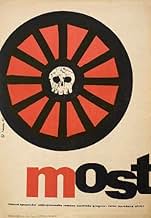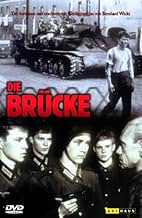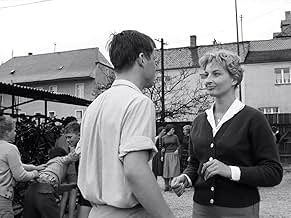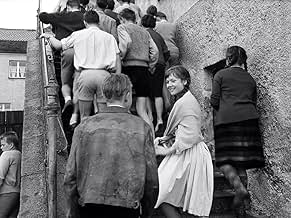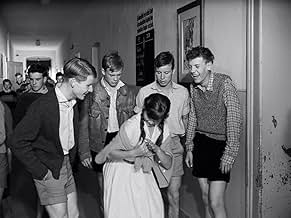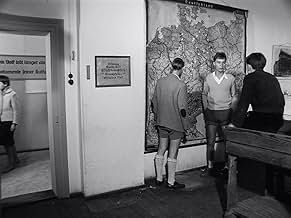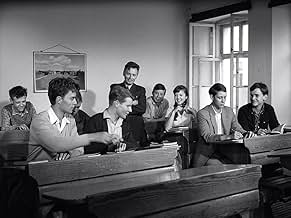IMDb रेटिंग
7.9/10
9 हज़ार
आपकी रेटिंग
अपनी भाषा में प्लॉट जोड़ेंIn 1945, Germany is being overrun, and nobody is left to fight but teenagers.In 1945, Germany is being overrun, and nobody is left to fight but teenagers.In 1945, Germany is being overrun, and nobody is left to fight but teenagers.
- 1 ऑस्कर के लिए नामांकित
- 16 जीत और कुल 1 नामांकन
Volker Bohnet
- Hans Scholten
- (as Folker Bohnet)
Günter Hoffmann
- Sigi Bernhard
- (as Günther Hoffmann)
फ़ीचर्ड समीक्षाएं
10bugs-32
In my opinion is the best war film I've ever seen. The story is one o the best examples of the nonsense and madness of war. Seems incredible that this movie has been done by Germany and released after 14 years since the end of the war. You can see a traumatic passage from childhood to maturity in the principal characters. The film is from the late fifties so there is no big special effects like "saving private Ryan". Also, the movie is not showing a major and historical battle, with a lot of soldiers and tanks fighting between explosions. In fact,the war scenes can be seen only in the last half hour. The final scene on the bridge is one of the most disturbing scenes of war films.
A group of young students are ordered to protect a strategically totally unimportant bridge at the end of the war. The initial euphoria changes suddenly to fright while the Allies are entering. Probably one of the essential and most important anti-war films ever. Wicki convincingly captured the atmosphere of the last war days, this constant indecision between fear and hope and forlornness. Especially well made are the psychological portrays of the boys, their every day life in school, at home, within the clique and the mixture of real dedication and adventure mentality which leaves them to look at the war partly as national duty and partly as a romantic game. But as soon as the war collides with the life of the boys, the contrast between those close-ups of round-eyed, innocent child's faces and the churned up mud of the battlefield, as well as the bookish discourses of "courage" and "cowardice" makes the absurdity of the war pretty damn clear. Indeed, war is a game, but harrowing, arousing and bitter which has lost all gaily playfulness.
We were shown this movie at school, so I always remembered it as a politically correct piece educational film - which it is, in a way. This is film with a clear purpose. It wants you to learn something. The amazing thing is that it is also a good film. Its message "War Is Bad" is brought across not so much by showing blood, death and destruction but by the means of classical tragedy: There are no "bad guys" in this film; on the contrary, most people try to do good, be humane. (E.g. the boys are told to guard the bridge in order to keep them away from the front.) But what they do results in disaster, because the evil is war itself.
A couple of days before the end of World War II, seven sixteen year-old German boys of a small village are recruited for military service. The idealistic Hans Scholten (Folker Bohnet), Albert Mutz (Fritz Wepper), Walter Forst (Michael Hinz), Jurgen Borchert (Frank Glaubrecht), Karl Horber (Karl Michael Balzer), Klaus Hager (Volker Lechtenbrink) and Sigi Bernhard (Günther Hoffmann) join the army on 26 April 1945 with great expectations and enthusiasm to defend their motherland Germany in the front against the will of their parents. Their English teacher Stern (Wolfgang Stumpf) unsuccessfully tries to convince Commander Fröhlich (Heinz Spitzner) to refuse the enlistment of the youngsters. After one day training, the soldiers are summoned to the front but the Commander of the 463rd Battalion of the 3rd Company assigns Sergeant Heilmann (Günter Pfitzmann) to stay with the rookies "protecting" a useless bridge in their village in order to spare the boys. However, in the chaos of the imminent defeat with German soldiers fleeing from the American troops, Heilmann is murdered and the boys defend the small bridge with their lives on 27 April 1945.
"Die Brücke" is another powerful and impressive German film about coming of age in times or war. This anti-war movie probably reflects the thoughts of the brain-washed youngsters by the Nazi ideology and propaganda in the 40's and is heartbreaking to see sixteen year-old boys playing war like a game and without awareness of the seriousness of the situation. Being a father, it is also very sad to see the powerless widows and mothers trying to protect their enthusiastic sons that want to fight to defend their country. The realism of this dramatic movie is awesome and totally different from the approach of Hollywood movies, where Germans are usually evil soldiers and the situation of the civilian population is forgotten, but unfortunately it has not been released in Brazil on VHS or DVD. My vote is eight.
Title (Brazil): Not Available
"Die Brücke" is another powerful and impressive German film about coming of age in times or war. This anti-war movie probably reflects the thoughts of the brain-washed youngsters by the Nazi ideology and propaganda in the 40's and is heartbreaking to see sixteen year-old boys playing war like a game and without awareness of the seriousness of the situation. Being a father, it is also very sad to see the powerless widows and mothers trying to protect their enthusiastic sons that want to fight to defend their country. The realism of this dramatic movie is awesome and totally different from the approach of Hollywood movies, where Germans are usually evil soldiers and the situation of the civilian population is forgotten, but unfortunately it has not been released in Brazil on VHS or DVD. My vote is eight.
Title (Brazil): Not Available
Made in 1959, "The Bridge" is one of the few films from the former West Germany that squarely faces the theme of Nazi defeat. It is a courageous work where content is all important, so much so that it hardly matters that the direction is rather limp and pedestrian and the acting somewhat less than impressive. It is an elegy to lost youth concluding with a caption that vents such anger through the irony of understatement that it earns without question a rightful place among the most seriously committed of anti-war films. The setting is an unspecified small town in Germany where to begin with, apart from a bomb dropped in the river and conversations about hardship and shortages, the war seems far more than a distant rumble away. We follow a group of seven 15 year old boys at school and play until the time when the rapidly approaching American front necessitates their call up and hasty military training. As the military front creeps ever closer they are given the role of defending a bridge over a river, the wisdom of which is seriously questioned by several of their superior offices but which they eagerly take on in the spirit of boyhood heroism combined with what one can well imagine to be the ideology instilled into them by past experience of the Hitler Youth. The terrible last half hour in which their baptism by fire is recorded in graphic detail through the stages of excitement, terror and death is gruelling to watch, the more so because the youth of the sufferers generates so much anger at such waste and loss. I would not for one moment claim the "The Bridge" is in the same league as Kubrick's "Paths of Glory", Helma Sanders-Brahms's "Germany, Pale Mother" or Klimov's "Come and See" - Bernhard Wicki is a lesser director who never quite succeeds in making each of the seven protagonists a memorable character - but nevertheless he manages convincingly to flesh out in dramatic form the terrible reality behind that awesome newsreel footage of Hitler encouraging boy troops amid the rubble of Berlin. "The Bridge" brings home more than most films the madness of it all.
क्या आपको पता है
- ट्रिवियाThe end credits suggest that the story relates to true events which supposedly happened on "April 27, 1945", but this specific story is fictitious, while the general use of teenage boys as soldiers in the last days of the Third Reich is accurate.
- गूफ़When the boys are assembled at night, they are told they will be part of the 336th Division. That unit was destroyed and surrendered to the Soviets on the Eastern Front nearly a year earlier in 1944 and was never reformed.
- भाव
Sigi Bernhard: Whoever defends one square foot of German soil defends Germany!
- इसके अलावा अन्य वर्जनAn English dubbed version was released in the USA in 1963.
- कनेक्शनEdited into Bernhard Victor Christoph Carl von Bülow genannt Loriot (2008)
टॉप पसंद
रेटिंग देने के लिए साइन-इन करें और वैयक्तिकृत सुझावों के लिए वॉचलिस्ट करें
विवरण
- चलने की अवधि1 घंटा 43 मिनट
- रंग
- ध्वनि मिश्रण
इस पेज में योगदान दें
किसी बदलाव का सुझाव दें या अनुपलब्ध कॉन्टेंट जोड़ें


